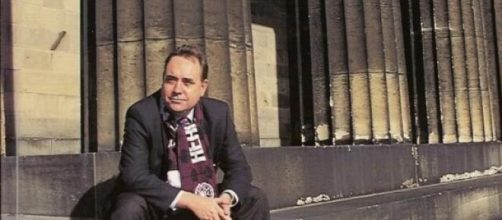It seems that when the 'Yes' campaign failed to gain Scotland home rule and with the resignation of Alex Salmond and the coronation of Salmond's anointed successor Nicola Sturgeon, everyone thought the Scottish National Party (SNP) would simply slink away and get on with governing Scotland.
However, it seems that Salmond and Sturgeon must have got together either before the Scottish referendum on home rule or after, and decided that should the 'Yes' campaign not deliver the home rule the SNP sought, they would hatch a plan B.
When Alex Salmond accompanied by his wife, flew away from Holyrood, seat of Scottish autonomy, in Edinburgh, via helicopter, must pundits thought with the devastating news of the success of the 'No' campaign, that was it, game over for Salmond, but how they were wrong.
Not long after the Scottish referendum, Alex Salmond appeared on BBC1's 'Question Time' hosted by David Dimbleby and appeared to indicate his time in politics wasn't over, at one stage it was even suggested he might stand as an MP perhaps in the north of England, in what capacity though goodness knows, certainly not for the SNP, at best he would have been an independent.
But things on the subject of Alex Salmond have become clearer when he announced he would be standing for a seat at Westminster, in the Gordon constituency, in Scotland. If elected, Salmond in Westminster and Nicola Sturgeon in Edinburgh along with the proposed 59 SNP MPs could cause all manner of hazards and demands for any party forming a majority or seeking to form another coalition after May's general election.
Working with the Conservatives, should the SNP find themselves in the role of kingmaker, they have refused to work with them and would be willing to work with Ed Milliband's Labour, to stop the Conservatives from returning to power and arrogantly Alex Salmond said he would even be writing Ed Ball's budget should Labour and the SNP form a coalition.
However, Ed Miliband has refused to do a deal with the SNP in forming a coalition government, it has been suggested though that perhaps Labour and the SNP would work together in a loose arrangement, where the SNP would talk to a Labour administration on a case by case basis on policy, that remains unlikely.
Nicola Sturgeon has been making a tour of England to show the SNP are not enemies of the English and that if in coalition in whatever arrangement, they would govern for the whole of the UK, certainly some of their policies seem friendly like the anti-austerity policies, but when it comes to scrapping Trident, thats certainly a 'no go area'.
The other equation in May's general election is UKIP and how many seats they will get which could see the coming to power as an MP of Nigel Farage, this would obviously have an interesting affect on politics and should the SNP get their 59 MPs at Westminster, the fall out from both these events would be unknown.
There remains for the SNP, the spectre of how they achieve home rule for Scotland once more, obviously for now they must work within the UK, but a referendum on a 'Yes' or 'No' vote will come up again sometime in the future.

